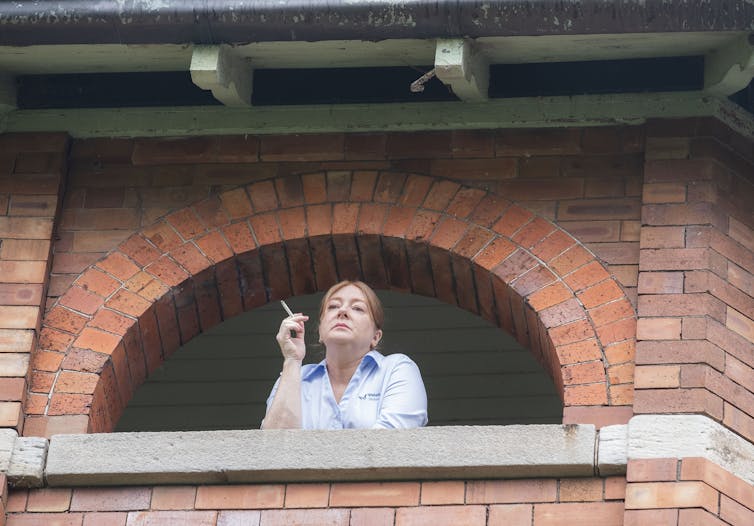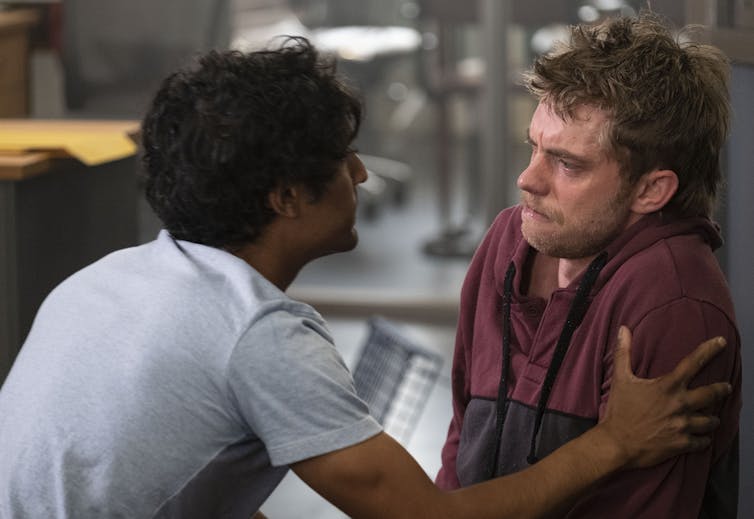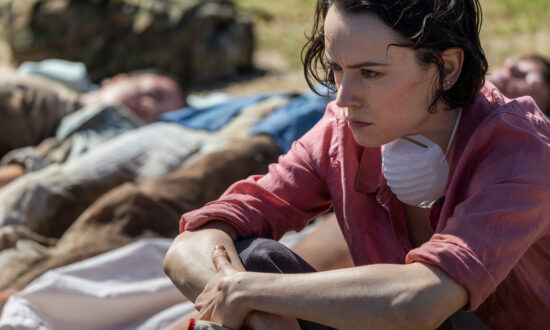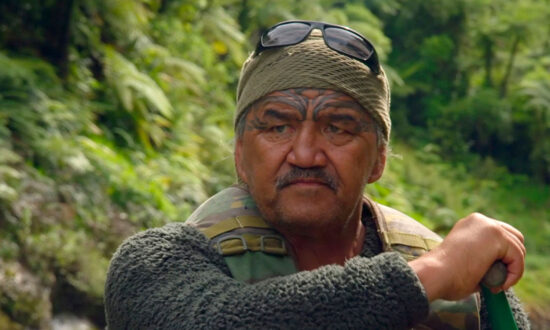From the comedy-drama of Josh Thomas’ Please Like Me, to the documentary series Changing Minds filmed inside a psychiatric hospital, the ABC has a track record of collaborating with mental health organisations and people with lived experience to create compelling, compassionate stories about mental health.
Created by Kristen Dunphy and inspired by her own experiences as a patient, new series Wakefield is a fictional drama mystery set in a psychiatric hospital in the Blue Mountains.
Wakefield presents a nuanced, multi-layered story about mental health through its ensemble cast. This eight-part series demonstrates the advantages of television’s long-form narrative over feature film. It provides greater scope to explore a range of mental health stories without resorting to caricatures and stereotypes.
Characters on a spectrum of mental health
Wakefield’s first episode focuses on four characters: two patients and two staff members. Each is at a different stage in their mental health journey, from recognising their needs and seeking support, to taking the first steps towards recovery.
We first meet James (Dan Wyllie), dressed in a suit jacket and tie, talking on the phone with his business partners. The camera pulls back from a tight close-up on James’ face to reveal he is wearing pyjama pants – his office is actually a room in a psychiatric hospital.
This visual conceit suggests a man desperately keeping up appearances and living in denial of his mental health needs, which has led to him being hospitalised following an overdose. James is constantly negotiating with hospital staff for access to his phone and laptop, as he tries to keep up the pretence of a man still in control.
We next meet Ivy, a young mother of a newborn baby, returning to the hospital from a walk to the shops. As played by Megan Smart, her anxiety and fear about caring for this fragile new life are palpable.
By introducing James and Ivy doing everyday activities, Wakefield challenges preconceived ideas about the spectacle of madness. These characters do not look unwell, but their struggles become evident in their interactions with others.
Connecting these two characters is Nik (British actor Rudi Dharmalingam), a psychiatric nurse who responds to James’ demands and Ivy’s anxiety with care and compassion. Nik is clearly good at his job. In the first episode he de-escalates a potentially violent situation using a range of strategies (throwing and catching a ball, one-word answers) to help another patient, Trevor (Harry Greenwood), calm down and articulate his feelings.
Nik’s empathetic approach to patients is in stark contrast to the officious and socially awkward head nurse Linda (Mandy McElhinney). There are echoes of Nurse Ratched, the villain in One Flew Over the Cuckoo’s Nest, in Linda’s characterisation and her adversarial relationship with Nik. This cliche is tempered by the revelation of her own family situation and the way McElhinney conveys Linda’s desperation and vulnerability.

Mental health and inpatient care is presented in a more nuanced way than ‘us versus them’. Photo: ABC TV
Initially, Nik is presented as a stabilising influence but he is struggling with his own mental health. He can’t sleep and an ’80s pop song is increasingly intruding into his thoughts.
Flashbacks to Nik’s childhood suggest a repressed trauma; the repeated image of him standing perilously close to a cliff edge implies suicidal thoughts. His story reminds us mental illness does not discriminate.
Complex stories, real and imagined
In Wakefield’s second episode we meet patients Genevieve (Harriet Dyer) and Tessa (Bessie Holland) and psychiatrist Dr Kareena Wells (Geraldine Hakewill), who is struggling with anxiety and feelings of guilt about a patient’s death.
This episode includes the experiences of carers through Genevieve’s partner, Raff (Ryan Corr), and Tessa’s mother, Belle (Heather Mitchell). The diversity of perspectives is emphasised by repeating key scenes shot from different camera angles, which present another character’s perspective on the same event.

Get InReview in your inbox – free each Saturday. Local arts and culture – covered.
Thanks for signing up to the InReview newsletter.
Wakefield’s multiple stories of mental health issues are told through a mix of realist and non-realist techniques, including vibrant musical performance numbers that put the viewer inside the character’s mind, showing the world as they perceive it.
Wakefield credits Dr Mark Cross, who featured in Changing Minds, as consultant psychiatrist. Several mental health organisations are also acknowledged, including Mindframe, Headspace, Lifeline, Black Dog Institute, Beyond Blue, Mind Australia and SANE Australia.
It is encouraging to see Australian screen producers collaborating with mental health experts to create authentic stories about mental health issues. This expertise encompasses many voices.
With Wakefield, Kristen Dunphy has brought to the screen a fictional story inspired by her own experience as a patient and realised by her creativity as a screenwriter and show runner. The result is an original and complex portrayal of mental health.
Wakefield is available now for streaming on iView and premieres on ABC TV on April 18.
If this article has raised issues for you, or if you’re concerned about someone you know, please call Lifeline on 13 11 14 or Beyond Blue on 1300 22 4636. If life is in danger, phone 000.
Fincina Hopgood is a lecturer in Screen Studies at the University of New England, with research expertise in portrayals of mental illness in film and television. This article is republished from The Conversation under a Creative Commons licence. Read the original article.
![]()
Support local arts journalism
Your support will help us continue the important work of InReview in publishing free professional journalism that celebrates, interrogates and amplifies arts and culture in South Australia.
Donate Here





